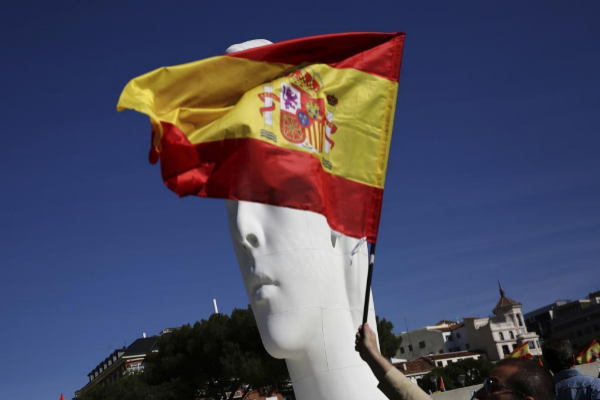- Coaliciones.Arrimadas raises an alliance with the PP and Feijóo resists
- Elecciones.Arrimadas proposes to Cs "weave alliances" with the PP
- PP.Casado asks for a "constitutionalist front" to stop Pedro Sánchez
One more deputy in Catalonia at the expense of ERC. Another in Galicia , who would have lost the PSOE. And two in the Basque Country: one from the PNV and another from Bildu. Now that Citizens value joining the PP in the historic communities to improve their sums in the next election dates, a question arises.
How much would the distribution of autonomous seats have changed if they had done so in the last elections? In the numerical, not too much. But the effect on the delicate balances of power could have been significant. Inés Arrimadas, for example, could have pressed the PSC and the commons to be portrayed, as it would have added with them and the PP more than JxCat and ERC without the CUP.
In the Catalan elections of 2017, Cs took one out of every five votes. The PP, on the other hand, produced one of its worst results (4%). The distribution system causes that, with the same votes, a single list can add more seats. In the 2017 Catalan, a list with Cs would have served the PP not to throw 10,902 votes in Lérida, one of the two provinces where it did not get representation. A seat of more.
The current situation is far from that of two years ago. Cs will face the regional ones after the collapse in the general -from 57 deputies to 10-. What together with the weakness of the PP in Catalonia, now encourage union. "[The pact] It makes sense because, unless something very strange happens, the block formed by Citizens and the PP should lose votes in Catalonia," says political scientist Berta Barbet , a researcher at the Autonomous University of Barcelona and editor of Politikon
"In 2017, Citizens captured a non-irrelevant part of the vote that until then went to the PSC," he says. The hard profile of Arrimadas seduced an anti-independence voter who could return to opt for the Socialists.
The electoral viability of the strategy
The most recent surveys in Catalonia suggest that those votes borrowed could return to their origin. According to the last barometer of December of the Center for Opinion Studies of the Generalitat ( CEO ), the PSC would rise between seven and eight seats, while Cs would lose more than half of its deputies in the Parliament. A survey conducted by Electomanía after Quim Torra announced that he will call elections pointed in the same direction.
If Cs agrees to join it would be to try to get a deputy in two communities, Galicia and the Basque Country, where he has no representation. The simulation of the distribution of seats with a joint list shows that, with the same number of votes, the strategy would have worked.
In the Galician Parliament, the sum of the PP and Citizens would have given one more seat La Coruña at the expense of the PSOE. And in a tight scenario like the one expected - the surveys do not guarantee Alberto Núñez Feijóo the absolute majority against PSOE, Podemos and BNG - it is crucial.
In the Basque Country, the more than 120,000 lost votes of Cs would have been transformed, together with those of the PP, into two more seats. One in Álava , at the expense of the PNV. And another in Biscay , from Bildu. "If a while ago the PP admitted a certain weakness to want to join Cs, now the situation is the reverse," said Enrique Cocero , political consultant and founder of 7-50 Strategy .
The concept of territoriality
Beyond electoral mechanics are other issues, such as territoriality. "The relative success of Navarra Suma was that both the PP and Citizens put themselves at the service of a party that had a great value in Navarra: territoriality," says Cocero.
For this political consultant, Citizens is the one who would win the most, for example, in a region like Galicia, where the PP has that territoriality.
In Catalonia, the psychological issue goes through the fight between blocks: the junts pel no . "When two parties are not so separated, there can be confusion in the voter. In that case, going together can create a fairly clean ideological block," Barbet explains.
The problem? For Cs it means giving up a flag that has flown since its origin. In Catalonia, it continues betting on the opposition to independence as its defining feature. The union with the PP can blur that characteristic: "The pact is conservative," says Barbet.
Spain Suma would prop up the right turn of Cs. "The orange party had, somehow, two souls: a conservative and right-wing and another progressive and left-wing," recalls the political scientist.
Vox's role
By committing not to agree with Pedro Sánchez, he opted for one of the two. "For a part of that Cs voter who came from voting for the PSC and who is dissatisfied with the agreements with Vox in other communities, the pact with the PP may be what will definitely return him to the PSC," Barbet adds.
And whoever doubts between a center-right block and Vox? For Cocero, the PP-Cs union would benefit Santiago Abascal's party: "To target two rivals, Vox would only have to point to one place."
According to the criteria of The Trust Project
Know more- Spain
- Catalonia
- Basque Country
- Citizens
- Inés Arrimadas
- PP
- Autonomous Elections
- Data journalism
Politics Inés Arrimadas proposes to Cs "weave alliances" with the PP for the elections of Catalonia, the Basque Country and Galicia
Politics Inés Arrimadas raises an alliance with the PP and Alberto Núñez Feijóo resists
Politics Citizen charges rebel against the proposal of Inés Arrimadas of Catalonia Sum

